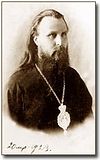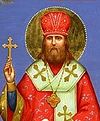

| Previous day | Next day |
| Old Style
April 27
|
Sunday |
New Style
May 10
|
| 4th Sunday of Pascha. Sunday of the Paralytic. Tone 3. | No fast.
|
![]() Apostle of the Seventy and Hieromartyr Symeon the Kinsman of the Lord, bishop of Jerusalem (107).
Apostle of the Seventy and Hieromartyr Symeon the Kinsman of the Lord, bishop of Jerusalem (107). ![]() Righteous Tabitha of Joppa (1st c.).
Righteous Tabitha of Joppa (1st c.).
St. Eulogius the Hospitable, of Constantinople (6th c.). St. Stephen, abbot of the Kiev Caves and bishop of Vladimir in Volhynia (1094). ![]() Second translation of the relics (1711) of Martyr Abraham of the Bulgars on the Volga (1230). St. Basil (Kishkin), hieroschemamonk of Glinsk and Ploshchansk hermitages (1831).
Second translation of the relics (1711) of Martyr Abraham of the Bulgars on the Volga (1230). St. Basil (Kishkin), hieroschemamonk of Glinsk and Ploshchansk hermitages (1831).
New Hieromartyrs Paul Svetozarov, archpriest, and John Rozhdestvensky, priest, and with them Martyrs Peter Yazykov, Nicholas Malkov, Auxentius Kalashnikov, Sergius Mefodiev, and Anastasia of Shui and Palekh (Vladimir) (1922). Glorification of New Hieromartyr Hilarion (Troitsky), archbishop of Verey (1999).
St. Pollion the Reader, of Cibalis in Pannonia (306). St. Nicon, abbot, of the monastery of St. Gerasimus (6th c.). St. Floribert, bishop of Luik (Neth.) (746). St. John the Confessor, abbot, of Cathares Monastery at Constantinople (832). Burning of the relics of St. Sava I of Serbia by the Turks (1595). New Martyr Theodore of Byzantium, who died at Mytilene (1795). All Saints of Euboea.
Thoughts for Each Day of the Year
According to the Daily Church Readings from the Word of God
By St. Theophan the Recluse

Sunday of the Paralytic. [Acts 9:32–42; John 5:1–15]
Behold, thou art made whole: sin no more, lest a worse thing come unto thee (John 5:14). Sin does not strike only the soul, but the body as well. In some cases this is exceedingly obvious; in others, although not so clearly, the truth remains that the illnesses of the body always stem from sins. A sin is committed in the soul and directly makes it sick; but since the life of the body comes from the soul, then the life coming from a sick soul is of course not healthy. The mere fact that sin brings darkness and sorrow must unfavourably act on the blood, in which lies the basis of bodily health. But when you remember that it separates man from God, the Source of life, and places man in disharmony with all laws acting in himself and in nature, then one must marvel how a sinner remains alive after sinning. This is the mercy of God, Who awaits repentance and conversion. Consequently, a sick person must rush first of all to be cleansed of sins and make peace with God in his conscience. This paves the way for the beneficial action of medicine. They say that there was one distinguished doctor who would not begin treatment until the patient had confessed and received the holy Mysteries; and the more serious the disease, the more urgently he insisted upon this.
Articles
 St. Eulogius the Hospitable of ConstantinopleSaint Eulogius the Hospitable lived during the fourth century in the Thebaid. |








